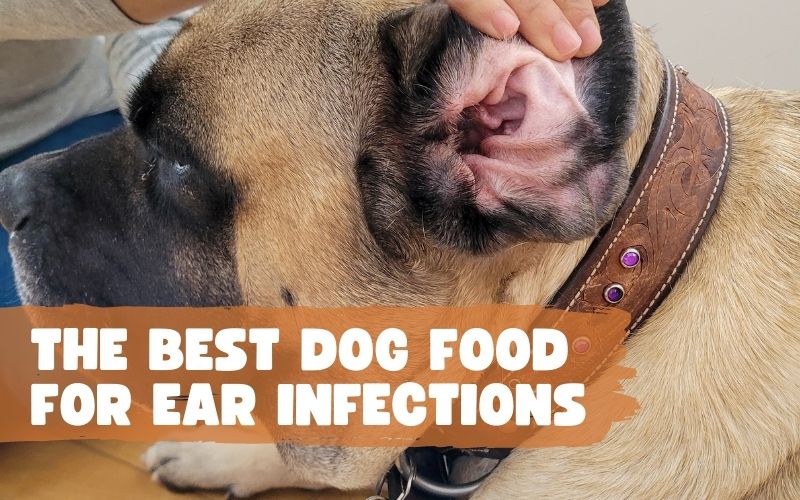There are many reasons why your dog may have an ear infection. While it’s critical to understand what’s causing the issue, it’s also critical to figure out how to solve it. Experts say that, in addition to accurate diagnosis and medication, proper feeding can make a significant difference in your dog’s condition.
If your best buddy is getting the appropriate combination of food and nourishment, eating right not only helps lower the risks of getting an infection but also aids in healing.
The best dog food for ear infections:
- Dry rabbit meal
- Pumpkin
- Lamb meal
- Turkey meal
- Dry dog food
- Peas
- Chicken
- Dried lamb liver and heart
- Dehydrated fish
- Dried coconut
- Dry chickpeas
- Carrots
- Blueberries
- Dry salmon
Digestive health maintenance in dogs with a yeast ear infection
The condition of your dog’s gut is crucial to its general well-being. Excess yeast and inflammation, which can contribute to recurring canine ear infections, will not be present if your dog’s intestines are healthy.
A healthy and balanced microbiota in your dog is made possible by a well-balanced gut. A healthy digestive system equals a healthy immune system. Dogs that consume a well-balanced diet are less likely to develop diseases or illnesses that can cause issues later.
Here is some dog food for ear infections.
1. Dry food containing fiber may help with dog ear infections.
Fiber helps dogs fight ear infections since excess sugar and grains in your dog’s digestive system are the leading causes of yeast overgrowth. Fiber aids your dog’s digestion and ensures that everything moves smoothly through the system. With the right amount of fiber, your dog’s balanced microbiome can avoid yeast overgrowth by moving more yeast into their intestines faster.
In addition to preventing yeast overgrowth and inflammation, the appropriate combination of insoluble and soluble fiber in food keeps your dog’s gut ready to fight off any invasive bacteria or fungus that might cause ear infections.
2. Prebiotics in food help to prevent ear infections.
Prebiotic foods and supplements serve as a fertilizer, feeding the healthy bacteria in your dog’s lower digestive system. The good bacteria in your dog’s digestive tract flourish and maintain your dog’s intestines healthy and balanced when they get the proper nutrition. This helps to maintain your dog’s skin healthy and prevents food allergies and yeast infections.
3. Enzymes in food supplements are helpful.
The enzymes in food supplements will aid in the digestion of your dog’s food. The digestive system of your dog is complex and contains several organs. The better your dog’s digestion, the healthier its system is. As a result, the risks of yeast growth and inflammation are reduced, and the chances of ear infections are reduced as well.
4. Probiotics are also helpful to reduce the risk of ear infections and allergies in dogs.
Probiotics are the beneficial bacteria that live in your dog’s intestines. Adding these healthy bacteria through food supplements helps improve your dog’s digestive health. When beneficial bacteria get appropriate nutrients, they thrive, and the gut functions more efficiently. This will maintain the dog’s intestines healthy and avoid ear infections caused by digestive imbalances.
5. A grain-free diet can prevent ear infections.
Grain-free pet food has a high protein content and is low on the carbohydrate content. This allows your dog to digest food more easily. This benefits its health in a variety of ways, such as a healthy coat and skin, more energy, and a reduction in allergies and infections including ear infections. It will also help your dog to breathe better.
What food causes ear infections in dogs?
Ear infections and food allergies are caused by the immune system of the dog reacting to a potentially harmful component. Antibodies are produced by the immune system to combat and protect itself from this threat. Itchy or sensitive skin, ear infections, yeast infections, red or irritated eyes, sensitive stomach, or digestive difficulties are just a few of the symptoms.
Each dog is unique; what is allergic to one may not be allergic to others. However, some components are more likely to trigger allergic responses and ear yeast infections than others. Some common dog food allergens include wheat, corn, beef, chicken, eggs, soy, mutton, pork, dairy products, and wet fish.
Conclusion
Ear infections are common in dogs. They can, however, be highly inconvenient and unpleasant for your four-legged companion. Although the condition is not life-threatening, if left untreated, it can worsen and create trouble. Ear infections in dogs can be inherited and breed-specific in some cases.
If you suspect your dog has an ear infection, make an appointment with your veterinarian right away.
Also, as a responsible dog owner, ensure that your pet dog receives the best and most appropriate nutrition to avoid allergies and infections, especially if your dog is sensitive. In case your dog belongs to one of the breeds with large, floppy ears, take extra care when cleaning and caring for them.
